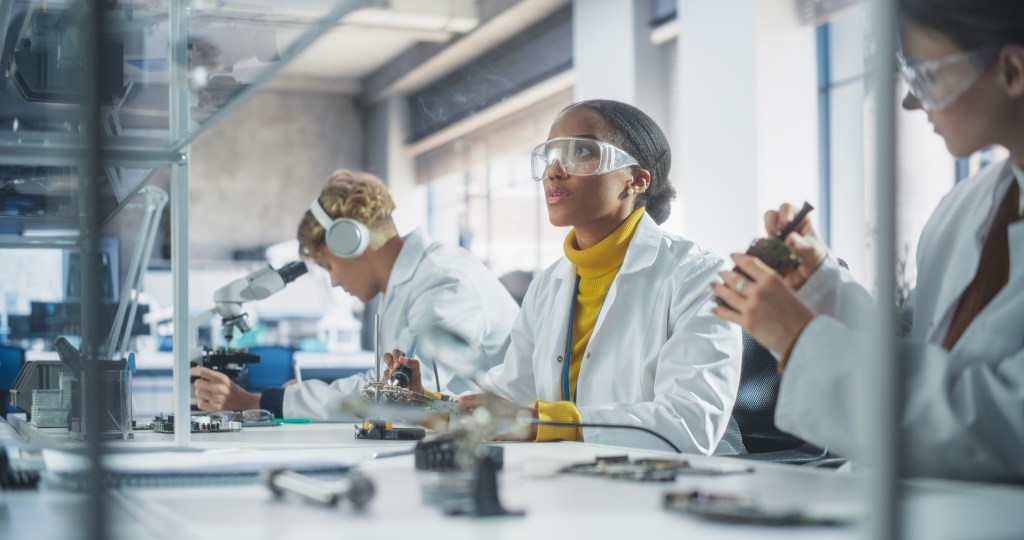Bridging the Gap: NA-22 Funds $50M for 2 New University Consortia
The National Nuclear Security Administration’s Office of Defense Nuclear Nonproliferation awarded Georgia Tech and the University of Tennessee-Knoxville consortia cooperative agreements in which Savannah River National Laboratory will collaborate. The two new NA-22 University Consortia awards will run for five years with a combined total budget of $50 million. The consortia cooperative agreements will support the universities in their research that underlies the Defense Nuclear Nonproliferation nuclear security and nonproliferation missions.
Georgia Tech’s “Enabling Technologies and Innovation 2.0,” or ETI 2.0, is a renewal of ETI 1.0 but with a few new focus areas. ETI aims to develop a research and education environment to support cross-cutting technologies across three core disciplines: computer and engineering science research in machine learning and high performance computing (HPC) that supports and enhances advanced manufacturing, and nuclear detection technologies. Georgia Tech’s ETI Consortium is composed of 14 institutions of higher education and 12 national laboratories, including SRNL.
The second consortium, the University of Tennessee – Knoxville’s “Enabling Capabilities in Technology,” or TecH, includes SRNL and seven other national laboratories. TecH creates new scientific knowledge in areas critical to DNN’s nuclear nonproliferation mission, applies new knowledge toward the creation of new nuclear nonproliferation capabilities, and generates the human capital needed for DOE/NNSA laboratories to address emerging challenges in nuclear nonproliferation.
The goal of the consortia is to expose college students to ongoing work at national laboratories and help drive innovation in areas of nuclear security and nonproliferation by connecting students with the opportunity to leverage their course work at participating laboratories.

(© Gorodenkoff – stock.adobe.com).
“It’s quite a jump from getting an advanced degree to working at a national lab,” said Martine Duff, SRNL senior scientist. “The consortia give us (national laboratories) a chance to interface with the universities and not only teach via STEM presentations but to also learn from them and help growth within the national laboratories.”
Duff also believes the university consortia is a career pathway SRNL can leverage to attract STEM majors to the roles of the future. “Being part of these university consortia helps pave the way for getting future STEM student intern participation and postdoc hires into SRNL,” said Duff. “These interactions serve as a bridge that fosters work on current and future collaborative projects. They also provide educational opportunities, career development and a lot of information exchange for all,” she said.
SRNL Senior Engineer Vincent Dinova was funded in graduate school under the Consortium for Nonproliferation Enabling Capabilities. During his five years in the program, he interacted with academic and national lab researchers across many disciplines. CNEC involved a diverse group of undertaking various scientific challenges, known as challenge problems, ranging from improving radiation detectors to using AI to detect illegal foreign actors from Twitter and Bitcoin interactions. “My specific challenge problem was to find suitable replacements for large industrial radioisotope sources that could be used in making a dirty bomb,” said Dinova. “The way we did this was by using a pulsed neutron generator to replace strong AmBe or Cf-252 sources and using machine learning to improve detection efficiency.”
Dinova’s work under the CNEC inspired him to pursue a career at a national laboratory, where he can work within a community of scientists and engineers, solving problems that impact the nation.
SRNL currently has two joint professorial appointees, Clemson University’s Brian Powell, Consortium for Nuclear Forensics and TecH, and the University of Florida’s Kyle Hartig, Consortium for Monitoring, Technology, and Verification and CNF. Since the inception of the DNN consortia in 2012, SRNL has hired two postdoctoral researchers and one full-time employee who participated in the consortia.